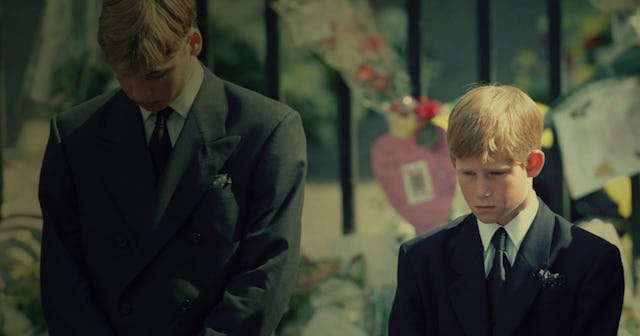Prince Harry Reveals Diana's Death Left 'A Huge Hole Inside' — And I Can Relate

Princess Diana’s (sudden) death in 1997 wasn’t just a shock to the royal family; her passing stunned the world. Millions mourned the loss of the 36-year-old mother and “people’s princess.” She was, after all, England’s rose. However, few people were affected as directly and intensely as her children, William and Harry. The young princes were just 15 and 12. And while the pair has spoken about Diana in the past, no revelation has been as candid or raw as Prince Harry’s most recent one. Late last week, the Duke of Sussex penned an emotional forward in which he admitted Diana’s death left “a huge hole inside” of him.
“If you are reading this book, it’s because you’ve lost your parent or a loved one, and while I wish I was able to hug you right now, I hope this story is able to provide you comfort in knowing that you’re not alone,” Harry wrote. “When I was a young boy I lost my mum. At the time I didn’t want to believe it or accept it, and it left a huge hole inside of me.” The Duke of Sussex felt angry. Empty. Lost. Like a part of him was gone. And this is a feeling I know all too well.
I lost my dad eight months before Harry lost Diana.
He was 39.
Of course, the circumstances were markedly different. My father died from a ruptured brain aneurysm. His heart failed, and he was declared brain dead. I, like Harry, stood graveside in black apparel at just 12 years old. But the feelings of hopelessness and helplessness — of emptiness, loss, and confusion; of feeling and believing I was completely alone — are familiar. It’s been 25 years since his passing, and I can still feel the weight of his death. It’s considerable and cumbersome, a heavy burden to bear. I can also still feel the sadness, not consistently or constantly but intermittently. Grief comes in waves, especially now that I am a parent. As I grow, I yearn for what I cannot have.
My father wasn’t at my graduation, for example, or able to walk me down the aisle. He missed my engagement party, dozens of birthday parties, and my baby showers. He missed the birth of his grandkids. And he missed my daughter’s first dance recital — and my first solo. He’s missed bike rides, family vacations, pizza nights, game nights, and trips to the beach.
Harry’s honest, raw, emotional, and very personal admission appears in the picture book, “Hospital by the Hill,” which he wrote the foreword for. “Hospital by the Hill” by Chris Connaughton is the story of a young person whose mother worked at a hospital and died during the pandemic. It is being given to children who have experienced similar losses.
hospitalbythehill.com
And while the circumstances of these losses differ from Harry’s (and mine), a consistent feeling — a sense of yearning — remains. When a parent dies, the grief can be intense, particularly when the parent dies suddenly or unexpectedly.
If you’re experiencing this, you are not alone — regardless of your age and/or the age of your parent.
“I know how you feel,” Harry continued. “And I want to assure you that over time that hole will be filled with so much love and support. We all cope with loss in a different way, but when a parent goes to heaven, I was told their spirit, their love and the memories of them do not. They are always with you and you can hold onto them forever. I find this to be true.”
I do too. I am not particularly religious, but the memories I have of my father remain. He taught me to swim, and how to burp the alphabet. Because of him, I learned how to not take life too seriously — and to ride a bike — and no one can take those thoughts. No one can take the stories, and no one can take the moments we shared.
Harry ended his foreword by telling young readers that their sadness will pass with time and only make them stronger. “Now, I never met them, but I know this person was special to you, and they were someone incredibly kind, caring and loving because of where they chose to work. Helping others is one of the most important jobs anyone can ever do,” Harry wrote. “You may feel alone, you may feel sad, you may feel angry, you may feel bad. This feeling will pass.”